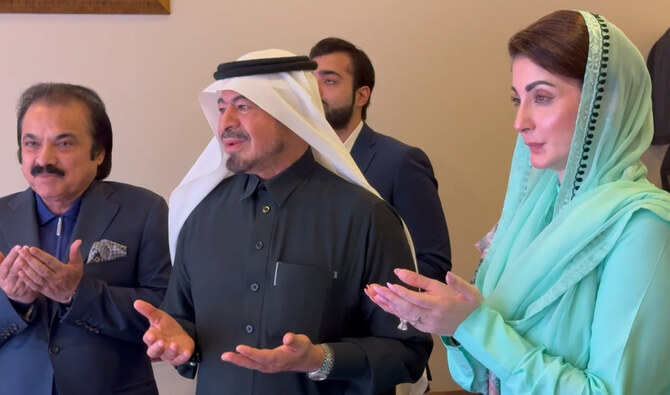ISLAMABAD: Chief Minister of Pakistan’s most populous Punjab province, Maryam Nawaz Sharif, has laid the foundation stone for a 300-bed Saudi-German Hospital in Smart City, Lahore, which will cost $250 million, state television reported on Tuesday.
The Saudi-German Hospital Network, founded in 1988, is a leading private health care provider in the Middle East and North Africa region. It is operated by the Middle East Healthcare Company and spans Saudi Arabia, the United Arab Emirates, Egypt, Yemen, Morocco and Pakistan.
Known for advanced medical care in specialties like cardiology, neurology and oncology, the Saudi-German Hospital collaborates with top German institutions and integrates AI-driven solutions. The network continues to expand and meet growing health care demands with a reputation for cutting-edge technology and skilled professionals.
“Chief Minister Punjab Maryam Nawaz Sharif has laid the foundation stone of Saudi-German Hospital in Smart City Lahore,” Pakistan Television Corporation (PTV) reported. “The hospital will be a 300-bed medical facility and will be completed at a cost of $250 million.”
The hospital will be equipped with state-of-the-art medical equipment and provide international standard medical facilities, it said, adding that the project would be a “huge source of employment for the people.”
PTV quoted Sharif as saying that the government values the private sector’s commitment to bringing positive changes to the country’s health care system.
She called improving the health care system her “priority,” with the Saudi-German Hospital marking a key milestone in enhancing public health and establishing a welfare society, according to state media.
Earlier in February, the Saudi Fund for Development approved a $40 million grant to build the King Salman Hospital in Pakistan’s northwestern Khyber Pakhtunkhwa province.
Last August, the Saudi-German Hospital signed a partnership deal with the Capital Smart City in Islamabad.
Saudi Arabia has been a key ally of Pakistan, providing financial aid, oil subsidies and investments in sectors like energy and health care. The two nations share strong religious and cultural ties, with millions of Pakistani expatriates contributing to both economies. Their partnership is further strengthened through trade, defense cooperation and diplomatic support.
Punjab CM lays foundation stone of 300-bed Saudi-German Hospital in Lahore
https://arab.news/gsbx4
Punjab CM lays foundation stone of 300-bed Saudi-German Hospital in Lahore

- $250 million hospital will be equipped with state-of-the-art medical equipment along international standards
- The Saudi-German Hospital Network is a leading health care provider in UAE, Egypt, Yemen and Morocco
Pakistan, Canada explore deeper trade, mining and agriculture cooperation

- The development comes as Pakistan seeks to boost trade, foreign investment to strengthen its more than $400 billion economy
- Both sides reviewed the evolving global economic landscape, underscored the need for adaptive trade strategies, Islamabad says
KARACHI: Pakistani and Canadian officials have discussed ways to deepen cooperation in trade, mining and agriculture, the Pakistani commerce ministry said on Saturday, with both sides seeking to expand economic ties.
The statement came after Pakistani Commerce Minister Jam Kamal Khan’s meeting with Canadian High Commissioner to Pakistan Tarik Ali Khan that focused on expanding bilateral cooperation in trade, investment, mining, agriculture, energy and emerging sectors.
Pakistan, which is recovering from a prolonged economic meltdown under a $7 billion International Monetary Fund (IMF) program, has sought to boost trade, foreign investment to strengthen its more than $400 billion economy.
“During the meeting, both sides reviewed the evolving global economic landscape and underscored the need for adaptive trade strategies amid shifting supply chains and geopolitical realignments,” the Pakistani commerce ministry said in a statement.
“The federal minister emphasized Pakistan’s intent to diversify partnerships and attract quality foreign investment, particularly in value-adding and export-oriented sectors.”
A major focus of discussions was cooperation in the mining and minerals sector. Pakistan has vast mineral resources, including Reko Diq copper-gold mine, which is one of the world’s largest undeveloped mines.
The Reko Diq project, located in the Balochistan province, is also being developed by Canadian mining giant Barrick Gold in partnership with Pakistan’s federal and provincial governments.
Commerce Minister Khan highlighted Pakistan’s growing interest in developing small and medium-scale mining projects and stressed the importance of modern exploration techniques, surveying expertise and responsible mining governance.
“The Canadian high commissioner noted Canada’s global leadership in mining services and exploration technologies and expressed willingness to support Pakistan through capacity-building initiatives, technical assistance and business-to-business matchmaking,” the commerce ministry said.
“In this context, both sides discussed Pakistan’s participation in the Prospectors & Developers Association of Canada (PDAC) conference in Toronto, with an emphasis on linking Pakistani miners with reputable Canadian exploration companies and service providers.”
The meeting also covered agricultural cooperation, with particular reference to the recent resumption of Canadian canola exports to Pakistan, according to the statement. The two sides acknowledged the successful arrival of initial shipments and agreed to work closely on addressing regulatory and procedural bottlenecks to ensure smooth and timely imports.
“Discussions further explored potential cooperation in dairy and livestock development, including animal genetics, modern dairy farming technologies and disease-control mechanisms, aimed at enhancing productivity and quality standards in Pakistan,” the commerce ministry added.
“On the energy front, the Canadian High Commissioner raised issues related to Canadian investments in renewable energy projects in Pakistan and stressed the importance of regulatory predictability and timely approvals to sustain investor confidence. Both sides also reviewed progress on the Pakistan–Canada Bilateral Investment Treaty (BIT) and agreed on the need to maintain momentum in negotiations to encourage greater Canadian investment.”










